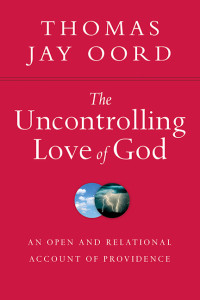Goldilocks and God’s Power
The story of Goldilocks and the three bears can help us think well about God’s power.
Some theologians in Christian history have thought divine power means that God controls everything. They often use the phrase, “God is sovereign.” Paul Kjoss Helseth, a contemporary advocate of the view, calls the view “divine omnicausality,” because God alone causes, preserves, and governs all things.
A God who controls everything, however, is morally accountable for everything that happens. The holocaust? God’s fault. Every rape, murder, genocide, and natural evil? Blame God. If God is all-controlling, then creaturely free will, randomness, and chance are illusions. Morality doesn’t make any sense either.
Like papa bear’s porridge, the all-controlling God is too hot!
The idea that God is uninvolved isn’t particularly satisfying either. Deism, a view whose heyday was centuries ago but which seems to be making a comeback of late, presents an aloof deity. This is Bette Midler’s God who is “watching us from a distance.”
We may not blame the deist God for evil. And this view of God’s power may allow us to account for freedom and chance in the world. But we also shouldn’t give credit to the deistic God for doing much, other than creating the world long ago. Deists seem prime candidates for what John Wesley called “practical atheism.” This God has a hands off approach to all matters.
Like baby bear’s porridge, the uninvolved God of deism is too cold.
In the quest for a “just right” understanding of God’s power, a popular view says God voluntarily self-limits. This view says God has the kind of power that could control anything and anyone at any time. God could be in control. But God has chosen to be self-restrained, and in this self-restrain from controlling others, God gives creation power, freedom, and agency.
This view, which says God voluntarily self-limits, seems attractive at first glance. In fact, some most famous theologians today endorse some version of it. They often call their view “kenotic theology,” drawing from the famous hymn in Philippians.
But is the voluntary self-limitation view of God’s power like mama bear’s porridge: just right?
I don’t think so.
The problem with a God who voluntarily self-limits is that this God could become un-self-limited at any time. Nothing but God’s own choice prevents God from controlling some situation. God could be in control of anything.
Many who say God voluntarily self-limits also say that when doing miracles, God sets aside self-limitation momentarily. God usually allows creatures to be self-determining. But on special occasions, God acts coercively.
The problem with the view that God voluntarily self-limits and occasionally coerces becomes obvious when we consider evil. A voluntarily self-limited God could stop evil at any time. This God has controlling power. Most kenotic theologians, therefore, say God “allows” evil. Or they say God “permits” pointless suffering. For some mysterious reason, they claim, God fails to intervene to rescue victims.
My friend, John Polkinghorne, affirms voluntary divine self-limitation. His words illustrate the issue well as it pertains to evil: “God does not will the act of a murderer or the destructive force of an earthquake but allows both to happen in a world in which divine power is deliberately self-limited to allow causal space for creatures.”
Bear crap!
The voluntarily self-limited God isn’t ultimately a satisfying view. The God who freely chooses restraint is culpable for failing to prevent evil. This God could prevent pointless pain but won’t.
The God who “allows” genuine evil isn’t steadfastly loving. A deity who permits pointless suffering can’t be trusted always to work for the good (Rom. 8:28). Like an unreliable friend, a God who doesn’t show up to stop evil is a God whose friendship is sporadic.
Imagine you had a neighbor who stood by and watched his son drown, even though he could have saved him boy. Suppose you ask your neighbor, “Why didn’t you save your son? Aren’t you a loving father?”
If your neighbor replied, “I love my son, but I freely chose to limit myself and allow him to drown,” you’d take him off your list of candidates for “Father of the Year.” Such “love” would make your blood run cold!
In my new book, The Uncontrolling Love of God: An Open and Relational Account of Providence, I offer a new vision of God’s power and love. Instead of God being voluntarily self-limited and accidentally kenotic, I say it makes far more sense to say God is involuntarily self-limited and essentially kenotic.
Essential kenosis says self-giving, others empowering love is necessary to God. God must love, because God’s nature is love. God must love because, as the Apostle Paul puts it, God “cannot deny himself” (2 Tim 2:13).
This means that God cannot withdraw, override, or fail to provide the freedom, agency, being, etc. God lovingly gives at all times. Consequently, the God of essential kenosis is NOT culpable for failing to prevent evil. The essentially kenotic God always expresses uncontrolling love.
To put it more technically, love is logically prior to power in God’s nature. Consequently, divine love necessarily palliates divine power. In God’s nature, love comes first.
There’s much more to my essential kenosis proposal than I can offer here. Of course, I encourage you to order a copy of The Uncontrolling Love of God and check out my arguments for yourself.
Upon reading my book, perhaps you’ll join Goldilocks and me and think essential kenosis theology is just right!
Tom
PS> I shot a short video to introduce my new book. Please take a look…



Comments
I don’t think we can blame God for all the evil that in the world when we have some many who are carnal mindedl
I am wondering where free will fits in essential kenosis? Did God give us free will or if not just how did we come to possess free will? If we say that God gave us free will then mustn’t we say then necessarily that God would then also self-limit God’s self to not interfering with our God-given free will? If God can and does interfere with our God-given free will is it truly free will or just the illusion of “choice” cloaked in a lie? If we have free will and we begin with that a God who truly loves will not coercively control our choice how does that inform our understanding of a God who is uncontrolling?
Thank you Tom for adressing this subject. I have found many honest thinking and delightful secularists putting christianity off just because of the illogical thinking of many christians concerning the tension between the almightiness and the infinite love of God, who is always there as the “I AM”. I ordered your book and can hardly wait to have it in my hands.